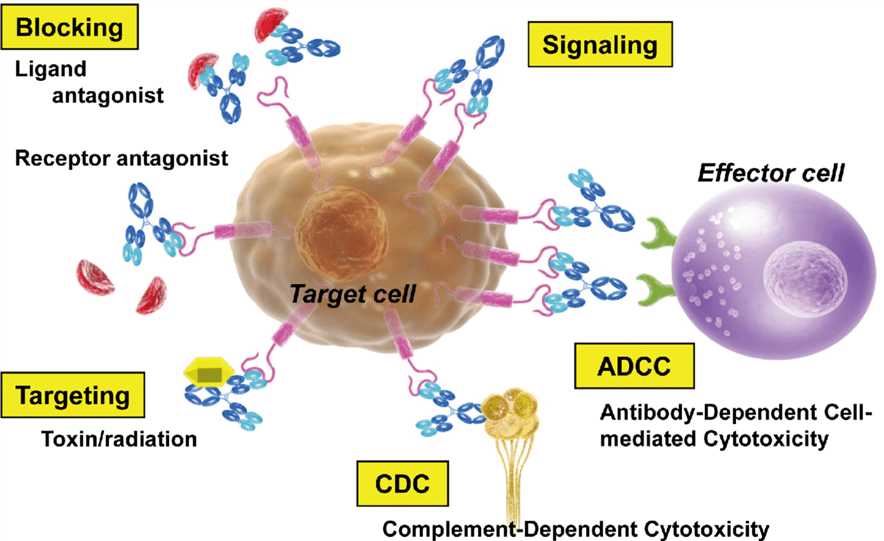In the past few years, a new class of drugs represented by PD-1 inhibitors has sprung up in the field of cancer treatment, attracting the attention of biomedical workers. Creative Biolabs is aware of the potential of these drugs and has established an excellent research team to create a high level of antagonist antibody development and detection platform. Our antagonist antibody therapy service technology platform is dedicated to providing high-quality services to our customers and working hard to turn the antibodies developed by our customers into usable pharmaceutical products.
Immune cells are strictly regulated by co-inhibition and co-stimulation receptors, which activate immune cells to function after binding to the ligand, while co-inhibition receptors inhibit signal transmission to prevent immune cells from attacking other normal cells. Tumor cells can avoid being targeted by immune cells by controlling these receptors, called immune checkpoints. In contrast, modern medical techniques have developed antagonist or agonist antibody drugs that activate or suppress the activity of immune receptors. These drugs specifically bind to various immune checkpoints and regulate the activity of immune cells. At present, antibody drugs related to antagonists have shown good effects in the treatment of many diseases including cancer, and many drugs are still in the development stage. It is foreseeable that such drugs will help us maximize the function of the body's own immune system in the defense of diseases in the future.
 Fig.1 Antagonist activity mechanism.
Fig.1 Antagonist activity mechanism.
In addition to their initial application in the field of oncology, antagonist antibodies have their ability to modulate the activity of the immune system, making them potentially useful in the treatment of many other diseases. Creative Biolabs has designed different antibody development and testing strategies for different diseases and even different targets. Our areas include but are not limited to:
Monoclonal antibodies can specifically recognize and bind antigenic proteins expressed on the surface of tumor cells. This feature allows them to target cancerous cells without affecting normal cells, making them an ideal drug model for cancer therapy. However, due to the complex metabolic process of tumor cells and the large difference in antigen expression, traditional therapeutic antibodies have not made breakthrough progress. The advantage of antagonist antibodies is that they target immune checkpoints that interact with immune cell surface proteins that are critical for tumor cells to evade the immune system, it blocks these proteins from inhibiting immune cells. At present, quite a few antagonist antibodies have been applied in the treatment of tumors. Their combination with traditional treatment methods improves the survival rate of cancer patients and reduces the risk of tumor recurrence.
Although much progress has been made in the diagnosis and treatment of hemophilia, the disease and its associated complications still plague many patients. At present, the development of hemophilia inhibitor antibody is mainly aimed at some patients with severe disease. The development of antibodies is a challenging task because of the variety of mutations that cause hemophilia. Creative Biolabs conducts detection and quantitative evaluation of inhibitors by Bethesda assay to screen potential inhibitor antibodies for customers.
The effector function of T lymphocytes is the cause of most autoimmune diseases and works by either directly damaging tissues or indirectly promoting inflammation and antibody responses. Co-stimulation and co-inhibition of T cell receptor molecules are the main pharmacological targets for interfering with immune-mediated diseases. These antagonist antibodies, such as anti-CD28, can tilt the co-stimulus/co-inhibition balance in favor of effector T cells while promoting inhibition through preexisting regulatory T cells. It has shown excellent therapeutic efficacy in a variety of autoimmune, inflammatory and transplantation models and in the safety of human phase I studies.
Metabolic diseases are usually caused by metabolic disorders or excess metabolism, which lead to various cardiovascular diseases and endocrine disorders. With the improvement of human living standards, the incidence rate of metabolic diseases is on the rise, and targeted drugs need to be developed for treatment. Current studies have found that the metabolic balance of some target receptor-modulating antagonists promotes energy expenditure, reduces body weight, and improves blood sugar symptoms and high cholesterol, such as CBR1 cannabinoid receptor antagonists, but these receptor antagonists generally pass It is tested for its ability to filter and is associated with other adverse reactions. Creative Biolabs believes that the key to solving these problems lies in the clarification of the antagonist mechanism. We have established a comprehensive animal model library to help customers accurately assess the safety and mechanism of the drug to be tested.
If you have any questions about antibody development, you can contact us by email or send us an inquiry to find a complete solution.
All listed services and products are For Research Use Only. Do Not use in any diagnostic or therapeutic applications.